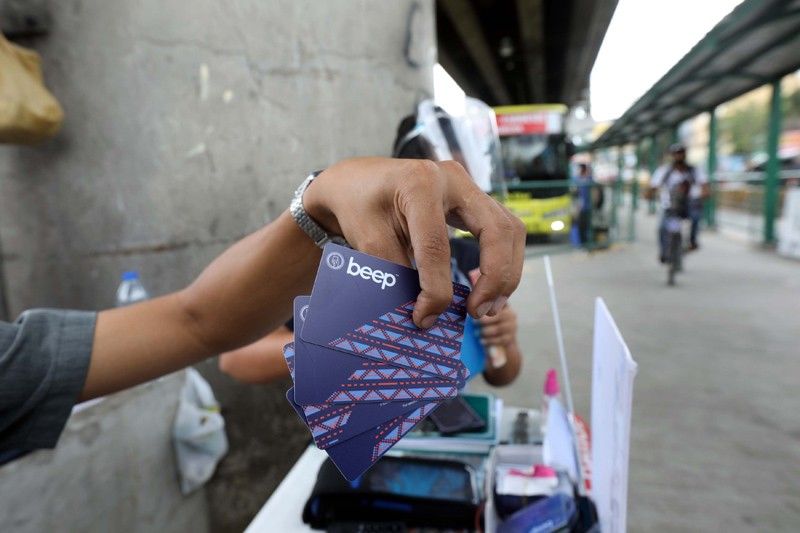DOTr urged to look for alternatives to Beep card as shortage hits commuters

MANILA, Philippines — A network of digital advocates urged the Department of Transportation to scrap its existing contract with its fare card provider after the latter was caught selling more expensive cards online despite the current shortage in MRT stations.
In a statement sent to media, Digital Pinoys national campaigner Ronald Gustilo said that DOTr's contract with AF Payments Inc., a consortium between the Ayala Group and the First Pacific Group, should be scrapped for profiteering from the supply shortage of the Beep cards in MRT stations.
This comes after AFPI informed the DOTr in August that it would not be able to deliver the 75,000 stored-value cards needed by the Metro Rail Transit-Line 3 for its July demand, saying it placed multiple orders with card makers abroad, only to be denied delivery due to a global supply crunch for chips.
"AFPI really have the gall to sell much more expensive Beep cards while MRT passengers are experiencing difficulty in purchasing beep cards in stations? They said the supply is not enough, how come they are able sell it in their stores in online shopping platforms for a much higher price?"
READ: DOTr warns of ‘Beep’ card shortage
According to Digital Pinoys, the stored value cards cost P188 in AFPI’s official online stores in online shopping platforms Lazada and Shopee excluding shipping fees. If bought from a rail station, the card's price is P100 with a P70 load balance.
"AFPI is taking the commuters and the government for a ride here. They may have been manufacturing the shortage for all we know. They should have first ensured that the supplies in MRT stations are sufficient before selling in online shopping platforms." Gustilo said.
Gustilo also said that DOTr should instead look for another prepaid card provider and also consider contactless payment methods to address the issue of card shortage in train systems.
The Digital Pinoys convenor added that many transportation systems around the world are using this technology and millions of Filipinos are using smartphones, making the transition to contactless payments not that hard.
"The DOTr should look for a more suitable prepaid card provider and also maximize digital currency providers more accessible to commuters such as GCash and Maya. This is an opportunity for the DOTR to make transportation just a tap easier by employing technology already widely available and do away with contractors that cannot deliver to its duties," he said.
Transport group urges interoperability in automatic fare collection
In a phone call with Philstar.com, transport economist Robert Siy of the Move as One transport coalition also called for the expansion of the existing automatic fare collection system, saying that while the practice is getting more common, interoperability among transport modes and routes still remains wanting.
"We could have rolled out you know, a much wider expansion of Automatic Fare Collection nationally, if we had put in place the right policies such as national standards for interoperable fare media. The idea is that different banks should be able to issue different types of fare cards. And, for example, a fare card from a bank in Manila, you should be able to use it in Cebu and Davao and they should all be interoperable. That's the type of fare collection system we need to move toward," Siy said.
"Everyone can be aware of how much is being collected every day and that will incentivize a coordinated operation and a coordinated service plan. And this is what we want in terms of improving the quality of the reliability of public transport."
Buses ferrying passengers to the Alabang district in Muntinlupa for example will use the TripKo cards, while bus companies like the Green Frog Zero Emissions Transport Corp. which serve the Parañaque Integrated Terminal Exchange to Bonifacio Global City route have their own proprietary beep cards for use on their buses only.
Meanwhile, the three rail lines and most other modernized jeepneys and P2P buses will use AF Payments' beep cards.
Amid rising prices, commuters may also feel the sting of having to use single-journey tickets instead of their usual beep cards. At the LRT-1, single-journey fares set them back P15 to P30 while stored-value rates go from P12 to P29. At the LRT-2, single-journey fares cost anywhere between P15 to P30, but beep cards only charge P12 to P28.
"I think there are also health and safety benefits of cashless fare collection and you don't have to handle all these cash or coins. Also for security, you won't have so many holdups on jeepneys or buses, and in terms of managing the public transport industry, you can actually if you have many different vehicles serving the same route, when you have a cashless fare collection system, you can motivate all the operators and drivers to work as one team because they will have a common fare collection," Siy also said.
— with a report from The STAR/Elijah Felice Rosales
- Latest
- Trending






























